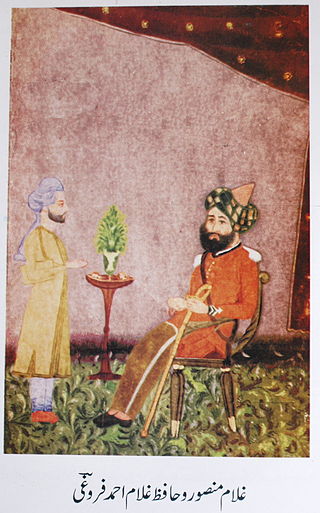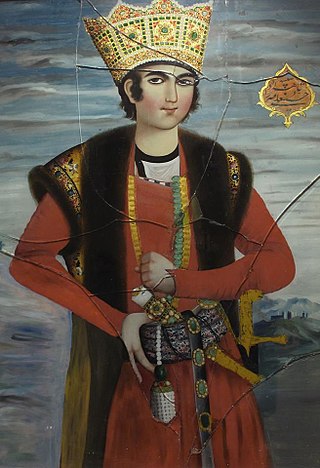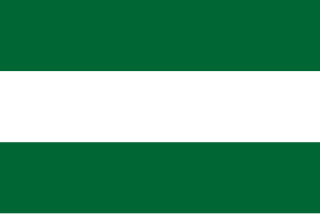
The Timurid Empire was a late medieval, culturally Persianate Turco-Mongol empire that dominated Greater Iran in the early 15th century, comprising modern-day Iran, Iraq, Afghanistan, much of Central Asia, the South Caucasus, and parts of contemporary Pakistan, North India and Turkey. The empire was culturally hybrid, combining Turko-Mongolian and Persianate influences, with the last members of the dynasty being "regarded as ideal Perso-Islamic rulers".

The Shāh Abdol-Azīm Shrine, also known as Shabdolazim, located in Rey, Iran, contains the tomb of ‘Abdul ‘Adhīm ibn ‘Abdillāh al-Hasanī. Shah Abdol Azim was a fifth generation descendant of Hasan ibn ‘Alī and a companion of Muhammad al-Taqī. He was entombed here after his death in the 9th century.
Mirza is a name of Persian origin. It is used as a surname or prefix to identify patriarchal lineage. It is derived from the term Mirzadeh.

Sultan Husayn Bayqara Mirza was the Timurid ruler of Herat from 1469 until May 4, 1506, with a brief interruption in 1470.

Mirzā Jahāngir Khān, also known as Mirzā Jahāngir Khān Shirāzi and Jahāngir-Khān-e Sūr-e-Esrāfil, was an Iranian writer and intellectual, and a revolutionary during the Iranian Constitutional Revolution (1905–1911). He is best known for his editorship of the progressive and satirical weekly newspaper Sur-e Esrāfil, of which he was also the founder. He was executed, at the age of 38, or 32, for his revolutionary zeal, following the successful coup d'état of Mohammad-Ali Shah Qajar in June 1908. His execution took place in Bāgh-e Shāh in Tehran, and was attended by Mohammad-Ali Shah himself. He shared this fate simultaneously with his fellow revolutionary Mirzā Nasro'llah Beheshti, better known as Malek al-Motakallemin. It has been reported that immediately before his execution he had said "Long live the constitutional government" and pointed to the ground and uttered the words "O Land, we are [being] killed for the sake of your preservation [/protection]".

Mirzā Abdul'Rahim Tālibi Najjār Tabrizi, also known as Talibov (طالبوف), was an Iranian Azerbaijani intellectual and social reformer. He was born in the Sorkhab district of Tabriz, Iran. Both his father, Abu-Tālib Najjār Tabrizi, and grandfather, Ali-Morad Najjār Tabrizi, were carpenters. No information concerning the maternal side of his family is available.

Ghulam Mansoor was Subedar-Major in 1867 at Bhopal State.

Haydar Khan Amo-oghliTariverdi was an Iranian left-wing revolutionary, key figure during the Persian Constitutional Revolution and among the founders of the Communist Party of Persia.

Abu Sa'id Mirza was the ruler of the Timurid Empire during the mid-fifteenth century.

Aliqoli Mirza Qajar was an Iranian prince of Qajar dynasty and scholar who served as the first Minister of Science in Qajar Iran. He was the forty-seventh son of Fath-Ali Shah, King of Iran. Aliqoli Mirza was fascinated by the European Enlightenment and tried to spread its ideals in Iran. During the heyday of the Dar ul-Funun college, he was the headmaster of the school and played a key role in its survival.

Mir Ali Mardan Shah, Nuzrat ol-Molk was a Timurid prince and the head of the Timurid dynasty in Persia.

The Iranian Enlightenment, sometimes called the first generation of intellectual movements in Iran, brought new ideas into traditional Iranian society from the mid-nineteenth to the early twentieth century. During the rule of the Qajar dynasty, and especially after the defeat of Iran in its war with the Russian Empire, cultural exchanges led to the formation of new ideas among the educated class of Iran.The establishment of Dar ul-Fonun, the first modern university in Iran and the arrival of foreign professors, caused the thoughts of European thinkers to enter Iran, followed by the first signs of enlightenment and intellectual movements in Iran.
The Book and Documentary Heritage Museum of Iran, an artistic historical museum based on the display of paper works, is one of the sections of the National Library and Archives of Iran. In this museum, a selection of historical works including books and non-books materials, documents, manuscripts, calligraphic tableaux and painting, periodicals, rare and exquisite printed books and works related to celebrities are exhibited.

Hossein Ali Mirza, a son of Fath-Ali Shah, was the Governor of Fars and pretender to the throne of Qajar Iran.

The Isfahan Seminary is one of the oldest seminaries in Isfahan, Iran. Currently, more than 40 schools in Isfahan province are under the supervision of the Management Center of Isfahan Seminary and the leadership of the supreme authority of Grand Ayatollah Hossein Mazaheri.

The Principality of Herat, the Emirate of Herat, the Herat Khanate or simply Herat was a state in Afghanistan from 1793 to 1863, and one of the three main khanates that existed in 19th century Afghanistan after the breakup of the Durrani Empire.

Yahya Khan Ghaffari also known as Abul-Hasan Salés, son of Sani al-Mulk, was one of the royal court painters of the Qajar era during the reigns of Naser al-Din Shah and Mozaffar al-Din Shah. He belonged to the artistic Ghaffari family, several generations of whom were involved in painting and miniature art.














